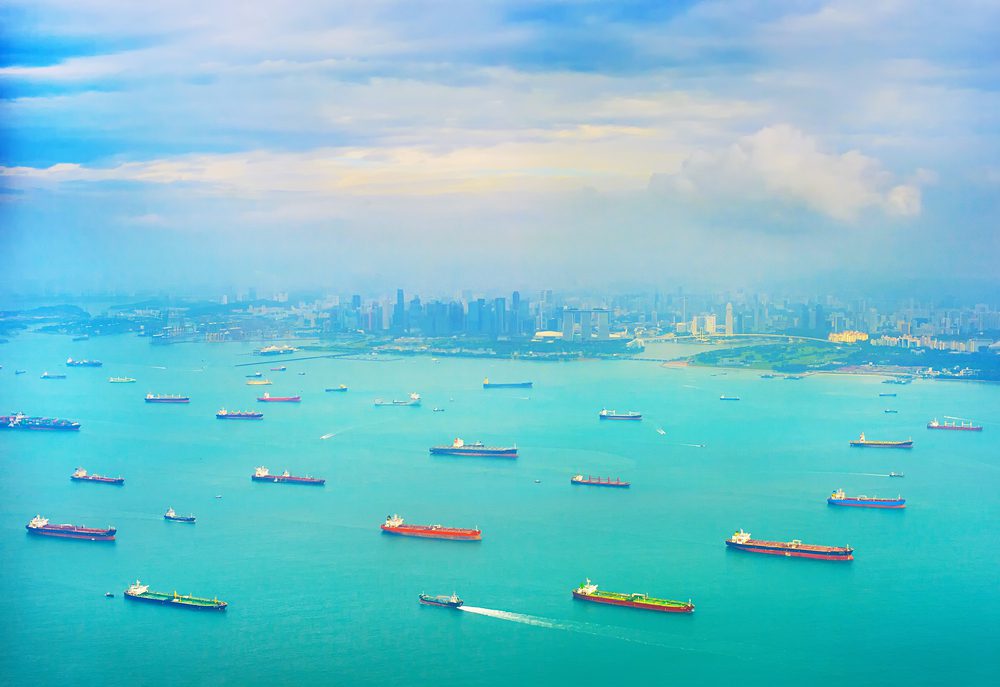Geopolitics, High Bids, and U.S. Pressure Cloud COSCO’s Global Port Ambitions
COSCO Shipping Ports is facing "challenges" with its international investments amid pressures from the U.S. trade war, its managing director said in Hong Kong on Thursday.

Photo: joyfull / Shutterstock
![]() By Roslan Khasawneh SINGAPORE, Oct 3 (Reuters) – Singapore stockpiles of low sulphur marine fuels held in floating storage are swelling ahead of a 2020 global deadline for rules that are said to mark the shipping industry’s biggest fuel transition since it moved from burning coal to oil.
By Roslan Khasawneh SINGAPORE, Oct 3 (Reuters) – Singapore stockpiles of low sulphur marine fuels held in floating storage are swelling ahead of a 2020 global deadline for rules that are said to mark the shipping industry’s biggest fuel transition since it moved from burning coal to oil.
The International Maritime Organization (IMO) has banned ships from using marine fuels, or bunkers, with a sulphur content exceeding 0.5% from Jan. 1, 2020 – compared with a cap of 3.5% now – unless they are equipped with so-called “scrubbers” to clean sulphur from exhaust emissions.
Concerns of supply shortages as the new rules kick in have eased as the amount of low-sulphur fuel oil (LSFO) and components to produce it that are being held in tankers around Singapore – by far the world’s largest bunkering hub – have risen steadily over the past few months.
“The LSFO stock-build in these floating storage (tanks) eases the transition into 2020, and shows that it is not going to be as catastrophic as some previously thought,” said Serena Huang, senior market analyst at oil analytics firm Vortexa.
About 4 million tonnes of LSFO are being stored on board 18 very large crude carriers (VLCCs) around Singapore, according to Vortexa’s latest assessments, up around 14% from industry estimates for IMO-compliant LSFO and components being held in tankers in July.
Taking into account Malaysian port areas, including Linggi about 200 km (125 miles) northwest of Singapore in the Malacca Strait, estimates of LSFO stockpiles rise further.
Analysts for Refinitiv in Singapore said on Thursday that there are about 7 million tonnes of LSFO and related blendstocks in floating storage in the city-state and neighbouring Malaysia, with another 2 million tonnes of fuel fitting the new specifications in landed storage.
Adding to regional supplies, ultra-large crude carrier (ULCC) Oceania – one of the world’s largest super tankers – arrived at Linggi this week filled with about 420,000 tonnes of LSFO and components, according to Refinitiv ship tracking data.
Refiners around the world, from Brazil to India and across East Asia, are also ramping up production of LSFO ahead of the 2020 deadline to meet the expected spike in demand as global shippers transition away from higher sulphur fuels.
“Concerns within the industry over the stability of (LSFO) have abated considerably, opening the door to much more rapid adoption of (LSFO) than we previously thought,” said research consultancy Energy Aspects in a note issued on Wednesday.
Energy Aspects as a result revised its demand estimate for the fuel to 1.5 million barrels per day (bpd), up by 50% from its forecast in 2018.
But while suppliers have stockpiled inventories of IMO-compliant fuels for months, other industry participants remain on alert over issues such as availability and how some of the new LSFO blends will perform in ship engines and holding tanks.
“I still anticipate mild chaos,” said a Singapore-based marine fuels trader who declined to be identified as he is unauthorized to speak to the media. (Reporting by Roslan Khasawneh; Editing by Tom Hogue)
(c) Copyright Thomson Reuters 2019.

Sign up for gCaptain’s newsletter and never miss an update

Subscribe to gCaptain Daily and stay informed with the latest global maritime and offshore news


Stay informed with the latest maritime and offshore news, delivered daily straight to your inbox
Essential news coupled with the finest maritime content sourced from across the globe.
Sign Up